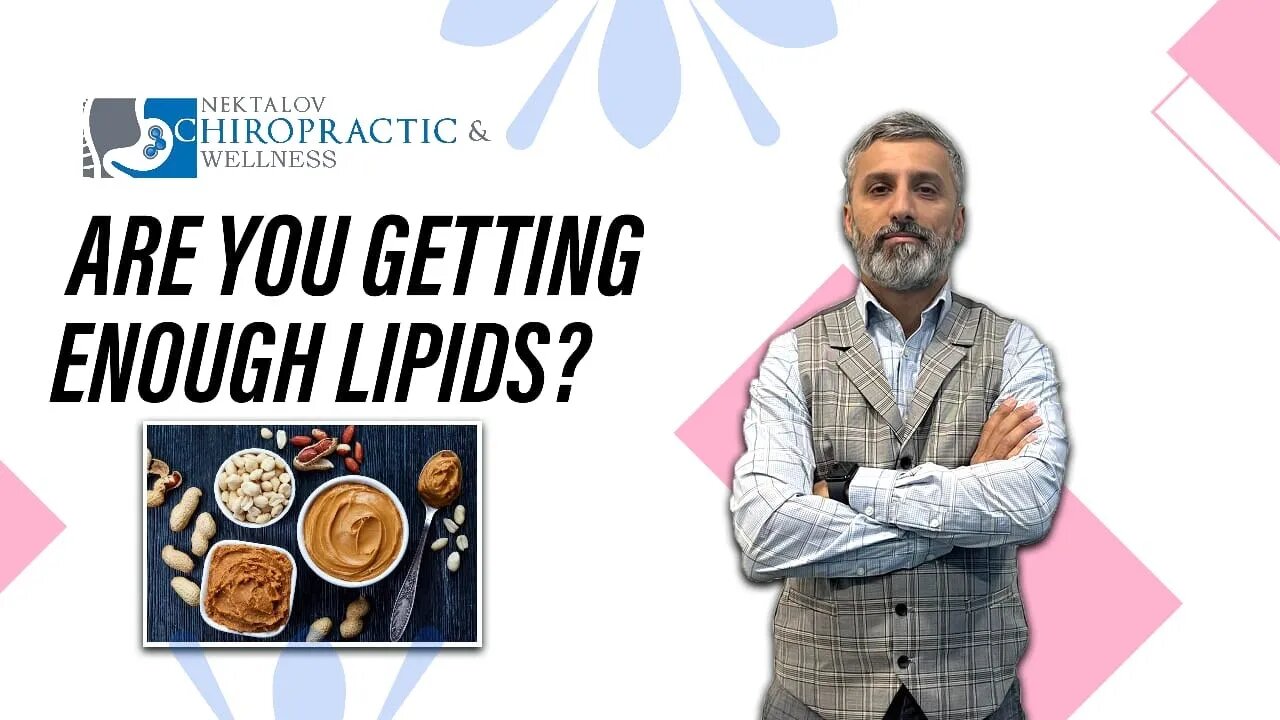Premium Only Content

ARE YOU GETTING ENOUGH LIPIDS? 🥜🐟🥩
And finally we have lipids.
Are you getting enough fat in your diet?
Hello everyone, if you are new to this channel I am Dr Boris Nektalov, Chiropractic and Enzyme Nutrition Specialist. We cover content on full body adjustments, spinal decompression and enzyme nutrition. If you like what you see please make sure to hit that like and subscribe button for more. We love hearing what you guys have to say and any questions you may have, so don’t forget to drop a comment down below.
Now back to Fats. Fats are needed for healthy function of skin, as well as nervous system, circulatory system, respiratory system and reproductive system. Fats are used for storing energy. Under normal circumstances, carbohydrates are body’s first choice for energy, then protein and then finally fats. However a body under stress seeks fats for energy first.
When your body is under chronic stress and using lipids for energy, the body will not be able to produce a balance of reproductive hormones. This results in both male and female reproductive issues and symptoms. In addition triglycerides will go up in the blood, insulin production goes down, and symptoms deviate towards those of metabolic syndrome and type 2 diabetes.
A deficiency of fats may result in one or more of the following:
Difficulty breathing Inability to control blood pressure Hair falling out
Dry skin Infertility Spontaneous miscarriages Inability to induce labor
Dear viewers this is very important, for unresolved, severe, or sudden onset of symptoms, please seek medical attention.
So why do you need adequate lipids levels?
There are a few categories of lipids. There are essential fatty acids such as linoleic acid and arachidonic acid. There are also other fat related substances, like phospholipids and sterols, which are essential for health. Sterols include vitamin D and cholesterol.
Essential fatty acids, phospholipids, and sterols do things like:
Promote conception, induce labor, and regulate the transmission of nerve signals
They also increase the absorption of other fats and keep them in emulsified state
They makeup cell membranes, form sex hormones, bile salts, and for the healthy function of the protective myelin sheath around nerve fibers, enhance calcium absorption in the GI tract and help calcium deposition in the bone
How does diet affect fat levels?
Emulsification and digestion of fats are crucial for it to be utilized properly by the body. The major absorption and digestion of fats will occur when stomach acid enters the duodenum. If stomach acid is reduced, the bile is thicker, and there is less fat absorption due to reduced emulsification. Fat needs to be obtained from the diet for lipids to be present in the stomach acid.
Fats have twice as many calories per gram as carbohydrates and proteins. Fat intake for adults should be 44 to 77 grams of fat per day in a 2,000 daily calorie diet.
The type of fats should be considered in the breakdown such as monounsaturated, polyunsaturated, saturated, and trans fats. Due to the adverse effect of fats, consumption should be limited to the recommended daily values.
Trans fats should be extremely limited and have 0% daily recommended percentage of total fats. Foods high in trans fats are solid margarine, coffee creamers, and certain brands of baked goods.
Saturated fats should be limited to 10% or less of daily fat percentages. Foods high in saturated fat are meats like beef, pork, veal, lamb, hot dogs, salami, and bacon, as well as cooking fats like butter, palm oil, and coconut oil.
Polyunsaturated fat should stay between 5 to 10% of daily fat percentages. Foods high in polyunsaturated fat are plant based such as sunflower, corn, soybean, and cottonseed oils, as well as nuts.
Monounsaturated fat can make up the highest level of fats, between 15-20% of daily fat percentages. Foods high in monounsaturated fat include avocados, olive, canola, and peanut oil, they also include nuts and nut butter.
Whether you are eating in or dinning out it is always best to choose foods that provide healthy fats.
Your food choices each day affect your health, how you feel today, tomorrow, and in the future will depend what action steps you will take today. Good nutrition is an important part of leading a healthy lifestyle. Combined with physical activity, proper diet with enzymes can help you reach and maintain a healthy weight, reduce risk of chronic diseases, and promote overall health.
Today not only I challenge you to reach out to your local digestive enzyme specialist doctor and ask to be evaluated and see how plant enzymes can help you achieve healthy gut, but also practice better food choices, cutting off simple carbohydrates, drink more water, reduce caffeine and sugary drinks. A habit takes 21 days to change, if you stick with it for 3 weeks you will see wonders you can do for your health.
I hope you found this information interesting and useful, please subscribe for more, hit like and ask any questions in comments.
-
 2:33:04
2:33:04
Badlands Media
12 hours agoBaseless Conspiracies Ep. 147
145K17 -
 4:33:42
4:33:42
Drew Hernandez
7 hours agoISRAEL BOMBS GAZA HOSPITAL ON LIVE TV KILLING AT LEAST 20 INCLUDING JOURNALISTS & CIVILIANS
17K16 -
 2:55:23
2:55:23
TimcastIRL
6 hours agoTrump Orders Specialized National Guard Units To Combat Crime In Cities, Dems Furious | Timcast IRL
196K138 -
 6:22:03
6:22:03
SpartakusLIVE
8 hours ago#1 Rocket CHAMPION of Verdansk wields UNSTOPPABLE new META
77.2K5 -
 2:55:11
2:55:11
Barry Cunningham
8 hours agoPRESIDENT TRUMP MADE TODAY A VERY BAD DAY TO BE A DEMOCRAT!
94.8K59 -
 1:15:29
1:15:29
Flyover Conservatives
1 day agoFrom Cool to Cringe: How Democrats Lost America’s Ear | FOC Show
44K13 -
 8:19
8:19
MattMorseTV
11 hours ago $7.72 earnedTrump is ACTUALLY DOING IT.
43.2K38 -
 11:30:43
11:30:43
ZWOGs
14 hours ago🔴LIVE IN 1440p! - Tarkov w/ Casey & crgoodw1n, Kingdom Come Deliverance, & More - Come Hang Out!
36.9K5 -
 2:30:56
2:30:56
We Like Shooting
18 hours ago $7.01 earnedWe Like Shooting 625 (Gun Podcast)
35K1 -
 1:45:02
1:45:02
Glenn Greenwald
9 hours agoIsrael Slaughters More Journalists, Hiding War Crimes; Trump's Unconstitutional Flag Burning Ban; Glenn Takes Your Questions | SYSTEM UPDATE #504
138K182